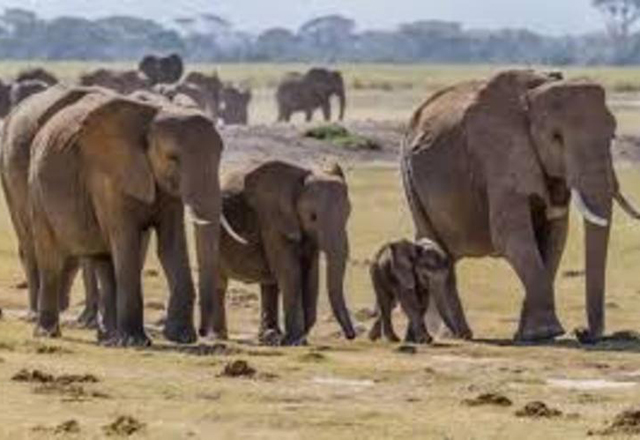Zim excelling in conserving its fauna and flora

Sydney Kawadza : Senior Features Writer
Two fateful incidents have been pushed as generic indicators of Zimbabwe’s wildlife story. Firstly, a cyanide poisoning of elephants by poachers in the Hwange National Park which shocked the world. At least the poisoning jerked authorities into action leading to the arrest of criminals involved in the crime.Secondly, the killing of Cecil the Lion by American dentist Walter Palmer which also sparked an international outcry.
The lion’s killing, though received with mixed feelings, led to greater scrutiny of trophy hunting for wild animals across the world.
Palmer, the Minnesota-based dentist, reportedly paid $54 000 to bow-hunt Cecil in the Hwange National Park.
These incidents could have put Zimbabwe in a bad spot.
However, African Wildlife Foundation president Mr Kaddu Sebunya who visited Zimbabwe recently believes the country is excelling in conserving its fauna and flora.
Mr Sebunya said Zimbabwe’s track record in wildlife conservation was outstanding.
“Even before I came here I was impressed with Zimbabwe. I mean you gave Africa Camp-Fire, it’s a Zimbabwean approach. I don`t know how much you appreciate it here,” Mr Sebunya said.
The Camp-Fire Association works with local communities in managing their land and wildlife for future generations.
It also helps the communities realise financial benefits from effective resource stewardship.
Mr Sebunya said Zimbabwe, having the second largest elephant herd in the world, must be doing something right in wildlife conservation.
“It’s a huge cost to this country but you must be doing something right which other countries are not,” he said.
“There are other countries which are losing elephants, the 30 000 that we (Africa) are losing annually are being lost in other countries.”
He, however, indicated the need to step up efforts to protect the wildlife.
This, Mr Sebunya said, was in line with the African development agenda which had, however, overlooked wildlife conservation.
The development vision is part of the African Union Agenda 2063.
“What I know is that there is no African who has said that wildlife doesn’t want to be here because I want to drive a better car, own a better house, roads or hospitals.
“But what we haven’t done is saying, in all this vision, what is the role of wildlife?”
The AWF president said there was a wrong assumption that wildlife will always be there on the continent.
He said with Africa losing 30 000 elephants annually, the animals could soon be extinct.
“At that rate our children will not have elephants, maybe only in Zimbabwe where you are doing a good job.”
He said the only way to maintain, protect wildlife and wild places on the African continent was for Africans to see direct benefits from their protection and conservation.
“Unless Africans benefit from wildlife we are not able to maintain the protection and the conservation,” he said.
“The benefit can come in many ways, it doesn’t have to come from sale of ivory and rhino horn, but it can.”
The newly appointed AWF president said any approach used for conservation must clearly demonstrate the benefits of conservation to the Africans.
Failure to outline benefits from wildlife conservation, he added, was contributing to the loss of animals.
“Anybody who tells you the benefits of conservation but fails to outline how it benefits the African is a joke. That’s why we are losing a lot of wildlife because most times people who are not Africans have defined conservation for us and we are following (their advice).”
Mr Sebunya said Africans need to drive the conservation agenda while appreciating the benefits.
“But we have to go further and say that change cannot be explained by foreigners; it must be by Africans,” the AWF leader said.
Mr Sebunya, who is from Uganda, said there was need to stop poaching of wildlife.
“We approach the poaching in three ways. We do what we call ‘Stop the Killing,’ that is what we are telling governments, illegal killings of animals through poaching must stop.
“Two, trafficking must be addressed and three, (stop) the demand.”
He hailed Zimbabwe for successfully protecting its rhino population.
He however called for more programmes to destroy the rhino-horn market.
“I have not seen rhino horn being sold in Zimbabwe, it is illegal here. It is not Zimbabweans who are killing rhinos but someone comes to this country, kills a rhino using some few Zimbabweans, smuggles it and takes it to Asia or North America where there is big market.”
He said no government benefits from rhino horn trade.
“Who knows, rhinos are not maybe important to you but someone is going to ask you when Zimbabwe figures out that rhinos are so important to the economy there will be 100 left from a herd of 4 000,” he said.
International trade in rhino horns, he added, was destroying the population in Africa.
Africans need to figure out how to gain from conserving rhinos, he said.
“Do not be trapped into just conserving rhinos and protecting rhinos, for what? We need to explain the benefit behind protecting rhinos.”
Mr Sebunya said Africa should value its rhinos, which attract a market from outside the continent.
“It shows that we have this valuable asset on the continent that is liked by so many people,” he said.
“So we need to just figure out how best we can gainfully manage to conserve and profit from them.”
The AWF has come up with an African Conservation Manifesto indicating conservation of wildlife and wild-lands as crucial to ensure their place on the continent’s development vision for the sustainability of human populations and species.
According to the manifesto much of the investment in Africa is related to major infrastructure projects.
“These development projects can have numerous direct and indirect effects,” the Manifesto argues.
“A pervasive threat to Africa’s natural heritage and overall long-term prosperity is lack of proper governance.
“Many African countries have failed to enact, revise or fully enforce their own laws to protect habitats and species.”
The manifesto for conservation, according to the AWF president, has one thread which runs through with the three supporting ideas.
“The thread . . . is that Africans need to decide what the role of wildlife and wild lands need to play in the economic development of Africa.
“Right now we are talking about human-wildlife conflict, benefit of wildlife and all these things (but) the main reason why that is so is that these discussions haven’t happened.
“I totally believe that once we have sat down and we come up with a reason why we are doing this, that will reduce most of the challenges facing wildlife.”
He said Africa needs to make a decision on the role wildlife plays in the development agenda.
“That is why we are working closely with the African Union around that issue. But along that, we are saying people must benefit from conservation and that will reduce the conflict.
“We would like to see the benefit to people from conservation and that needs to happen as quickly as possible,” he said.
The whole agenda of Africa, Mr Sebunya said, calls on African people and governments to decide the vision for the continent where wildlife and wild places must exist for our economic development.
There are steps the AWF is recommending in terms of policy.
“The first step, for example, we are suggesting that we shouldn’t recreate information, we wouldn’t like anyone to go research on elephant behaviour. We already know that.
“We now have to see how we can conserve elephants.”
Mr Sebunya said this could start with protected areas.
“Africa has more than a thousand protected areas. Let’s do them well, to start with as we find more important areas.
“For Zimbabwe and Africa, the least you can do is manage protected areas well. Or let agriculture be done so well in Africa.”
The AWF has also engaged the Zimbabwean Government on funding projects for sustainable wildlife conservation.
The AWF African Conservation Manifesto notes that Africa’s current economic development has the potential to improve millions of people’s lives.
The manifesto, however, argues that “as Africa develops, its wildlife and wild-lands are being impacted significantly resulting in loss of ecosystems services . . . ”
It further argues that based on its rich biodiversity, Africa’s potential is far from being realised.
Feedback: [email protected]








Comments